I am using MySQL with Zend Framework & Doctrine 2. I think even if you don't use Doctrine 2, you will be familiar with errors like
SQLSTATE[42000]: Syntax error or access violation: 1064 You have an error in your SQL syntax; check the manual that corresponds to your MySQL server version for the right syntax to use near 'ASC' at line 1
The problem is that I don't see the full query. Without an ORM framework, I could probably echo the sql easily, but with a framework, how can I find out what SQL its trying to execute? I narrowed the error down to
$progress = $task->getProgress();
$progress is declared
// Application\Models\Task
/**
* @OneToMany(targetEntity="TaskProgress", mappedBy="task")
* @OrderBy({"seq" = "ASC"})
*/
protected $progress;
In MySQL, the task class looks like
CREATE TABLE `tasks` (
`id` int(11) NOT NULL AUTO_INCREMENT,
`owner_id` int(11) DEFAULT NULL,
`assigned_id` int(11) DEFAULT NULL,
`list_id` int(11) DEFAULT NULL,
`name` varchar(60) NOT NULL,
`seq` int(11) DEFAULT NULL,
PRIMARY KEY (`id`),
KEY `tasks_owner_id_idx` (`owner_id`),
KEY `tasks_assigned_id_idx` (`assigned_id`),
KEY `tasks_list_id_idx` (`list_id`),
CONSTRAINT `tasks_ibfk_1` FOREIGN KEY (`owner_id`) REFERENCES `users` (`id`),
CONSTRAINT `tasks_ibfk_2` FOREIGN KEY (`assigned_id`) REFERENCES `users` (`id`),
CONSTRAINT `tasks_ibfk_3` FOREIGN KEY (`list_id`) REFERENCES `lists` (`id`)
) ENGINE=InnoDB AUTO_INCREMENT=3 DEFAULT CHARSET=latin1$$
